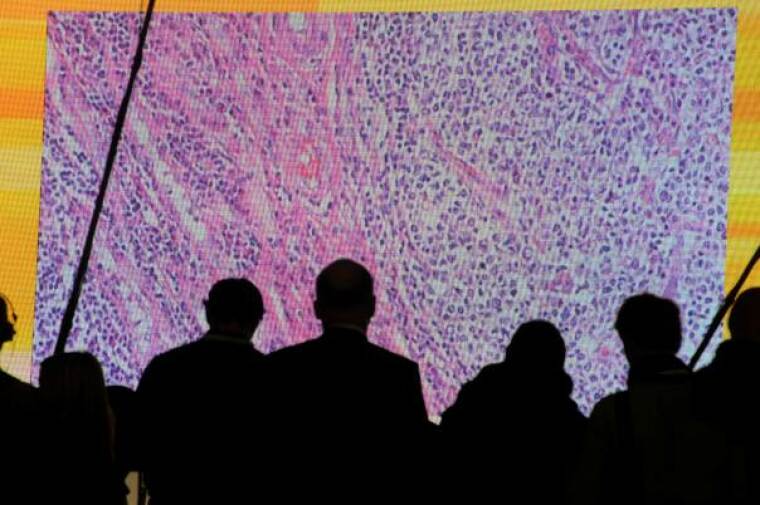Cancer cure news updates 2016: U.K. scientists work on groundbreaking laser therapy for early stages of Prostate Cancer
The connotations attached to the word "cancer" have always been terrible. Being a traitor disease, it can be a silent killer if not detected right away. But professionals all over the globe are continuing their efforts in trying to find a breakthrough that will hopefully end the devastating sickness, although admittedly, developments are arguably at a slow pace.

There are a lot of variations of cancers for women and men; for the former, breast cancer has been prevalent over the last few years while prostate cancer is something the latter should be careful about. British experts, however, have been working on a recent breakthrough that will help prostate cancer-struck males to kill the tumors causing the disease. The high-technology mechanism called Vascular Targeted Photodynamic therapy is done by injecting the prostate gland with a light-sensitive drug called WST11, into the bloodstream through fiber lasers.
"Currently when a man is diagnosed with early stage disease we are unable to accurately predict his risk of the cancer developing and causing harm," Dr. Matthew Hobbs of Prostate Cancer UK said and was quoted by Express. "Focal therapy treatments like this one have the potential to offer a middle ground option for some men with cancer that has not spread outside the prostate. By treating the cancer directly, rather than the whole prostate, this type of therapy could spare some men the long term side effects of other treatments."
Despite the groundbreaking discovery, the long-term effects of the scheme are still yet to be determined, as although it kills prostate cancer cells, it is unknown whether it can improve or even save the lives of men with the disease. It is important to note that according to the official study thus far, covering 47 treatment sites from ten European countries, 49% of the 413 men who tried it went to complete remission. This is compared to just 13.5% of those who were in the control group. Still, it does not take away the fact that there is potential in the treatment that can eventually save lives of men worldwide. It also gives men a more viable option in terms of action rather than just waiting for their cancer not to worsen any longer. That is why Cancer Research UK is committed to moving forward with tests to determine its effectivity.
"It's important these types of trials are done so we can assess and improve treatment for low risk prostate cancer patients," Professor Malcolm Mason of Cancer Research UK said.
 Christians don't have to affirm transgenderism, but they can’t express that view at work: tribunal
Christians don't have to affirm transgenderism, but they can’t express that view at work: tribunal Archaeology discovery: Medieval Christian prayer beads found on Holy Island
Archaeology discovery: Medieval Christian prayer beads found on Holy Island Presbyterian Church in America votes to leave National Association of Evangelicals
Presbyterian Church in America votes to leave National Association of Evangelicals Over 50 killed in 'vile and satanic' attack at Nigerian church on Pentecost Sunday
Over 50 killed in 'vile and satanic' attack at Nigerian church on Pentecost Sunday Ukrainian Orthodox Church severs ties with Moscow over Patriarch Kirill's support for Putin's war
Ukrainian Orthodox Church severs ties with Moscow over Patriarch Kirill's support for Putin's war Islamic State kills 20 Nigerian Christians as revenge for US airstrike
Islamic State kills 20 Nigerian Christians as revenge for US airstrike Man who served 33 years in prison for murder leads inmates to Christ
Man who served 33 years in prison for murder leads inmates to Christ


 Nigerian student beaten to death, body burned over ‘blasphemous’ WhatsApp message
Nigerian student beaten to death, body burned over ‘blasphemous’ WhatsApp message 'A new low': World reacts after Hong Kong arrests 90-year-old Cardinal Joseph Zen
'A new low': World reacts after Hong Kong arrests 90-year-old Cardinal Joseph Zen Iran sentences Christian man to 10 years in prison for hosting house church worship gathering
Iran sentences Christian man to 10 years in prison for hosting house church worship gathering French Guyana: Pastor shot dead, church set on fire after meeting delegation of Evangelicals
French Guyana: Pastor shot dead, church set on fire after meeting delegation of Evangelicals ‘Talking Jesus’ report finds only 6% of UK adults identify as practicing Christians
‘Talking Jesus’ report finds only 6% of UK adults identify as practicing Christians Mission Eurasia ministry center blown up in Ukraine, hundreds of Bibles destroyed: 'God will provide'
Mission Eurasia ministry center blown up in Ukraine, hundreds of Bibles destroyed: 'God will provide' Church holds service for first time after ISIS desecrated it 8 years ago
Church holds service for first time after ISIS desecrated it 8 years ago Burger King apologizes for 'offensive campaign' using Jesus' words at the Last Supper
Burger King apologizes for 'offensive campaign' using Jesus' words at the Last Supper Uganda: Muslims abduct teacher, burn him inside mosque for praying in Christ’s name
Uganda: Muslims abduct teacher, burn him inside mosque for praying in Christ’s name